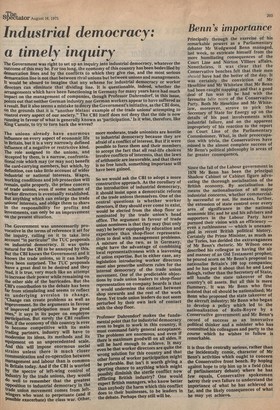Benn's importance
Principally through the exercise of his remarkable powers as a Parliamentary debater Mr Wedgwood Berm managed, last week, to extricate himself from the more humiliating consequences of the Court Line and Ncirton Villiers affairs. Nonetheless, it was clear that the Conservative benches felt that their men should have had the better of the day. It was certainly the conviction of Mr Heseltine and Mr Whitelaw that Mr Benn had been caught napping; and that a good deal of fun was to be had with the favourite bête noire of the Conservative Party. Both Mr Heseltine and Mr Whitelaw, moreover, strove to pick the Secretary of State for Energy up on the details of his past involvements with industrial failure, and on the apparent impropriety of his reaction to the report on Court Line of the Parliamentary Commissioner. What, in their preoccupa tion with trivia, the Conservatives have missed is the almost complete success of Mr Benn's political philosophy in areas of far greater consequence.
Since the fall of the Labour government in 1970 Mr Berm has been the principal Shadow Cabinet or Cabinet figure advo cating the thorough socialisation of the British economy. By socialisation he means the nationalisation of all major industrial concerns, whether commercially successful or not. He means, further, the extension of state control over every area of significance in the national economic life; and he and his advisers and supporters in the Labour Party have pursued their vision with an efficiency — even a ruthlessness — which is unexampled in recent British political history. Certainly the Prime Minister, as much as the Tories, has derided the extravagances of Mr Benn's rhetoric. Mr Wilson once described his colleague as having the air and manner of an Old Testament prophet; he poured scorn on Mr Benn's proposal to nationalise Britain's 100 top companies; and he has put it about that he and Lord Balogh, rather than the Secretary of State, will handle the state takeover of the country's. oil assets. But all this is mere flummery. It was Mr Benn who first insisted that oil should be nationalised; Mr Benn who proposed the state takeover of the aircraft industry; Mr Berm who began to develop a policy which led to the nationalisation of Rolls-Royce by a Conservative government; and Mr Benn's record of success as an innovative political thinker and a minister who has committed his colleagues and party to the course which he wishes to follow is remarkable.
It is thus the centrally serious, rather than the incidentally comic, character of Mr Benn's activities which ought to concern the Conservative front bench. By hoping against hope to trip him up in a field (that of parliamentary debate) where he has few equals, Conservative spokesmen betray their own failure to understand the importance of what he has achieved so far, and the likely consequences of what he may yet achieve.


































 Previous page
Previous page